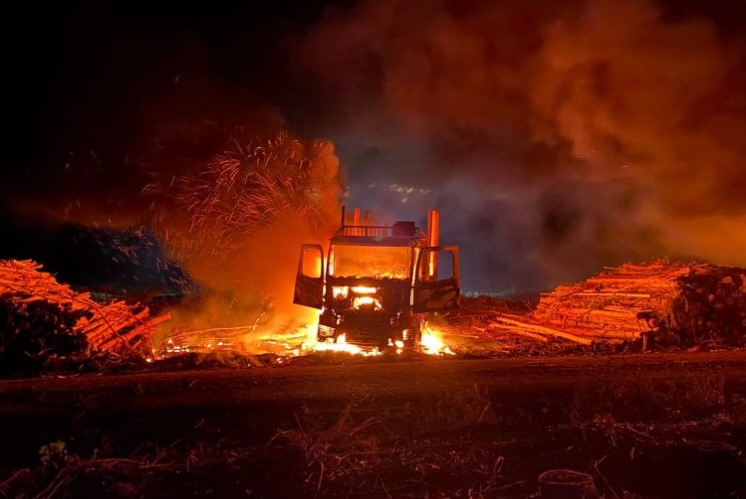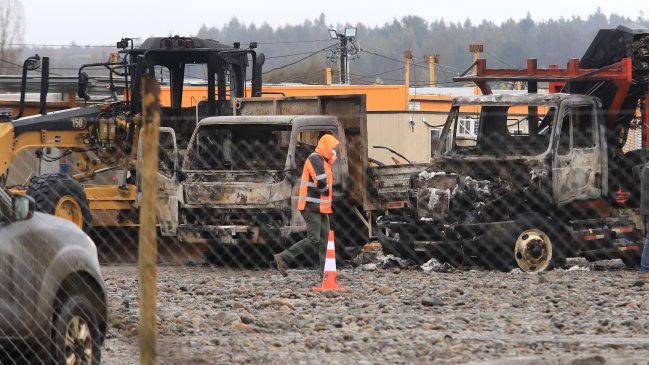They argue that similar guarantees are also necessary for farmers, merchants, and victims of violence in high-risk areas due to extreme violence. They point out that in 2022, arson attacks increased by 17%, with four forestry workers killed and another 20 injured.
A 17% increase in arson attacks on forestry operations during 2021 was reported in a summary by the Association of Forestry Contractors (Acoforag), which tallied a total of 104 violent incidents in the Southern Macrozone, resulting in four workers killed.
It is worth noting that this productive sector has been targeted since 2014 with armed attacks on forestry operations, including the burning of high-tech equipment. The most severe situation occurred in 2022, with the murder of four forestry workers and over 20 injured in these attacks.
Acoforag manager René Muñoz Klock addressed these events, stating, "2022 was the year with the most violent incidents, particularly in the regions of La Araucanía and Los Ríos. Biobío saw a 3% decrease, and Los Lagos a 25% drop compared to last year. Overall, attacks have risen by 17% compared to 2021, and we hope to start seeing a decline in the curve because this upward trend cannot continue every year." Muñoz also remembered César Millahual, Benjamín Cuevas, Alejandro Carrasco, and Segundo Catril, all forestry workers murdered at their workplaces in the forest.
On this point, he added, "They and their families are the silent witnesses of the irrational violence that crushes us and of a state that has abandoned the inhabitants of this part of the country, who carry out legal and formal work. They are the martyrs of this undeclared war on the timber industry, which is out of control."
DETAILS OF THE FIGURES
Among the reported figures, April and August stand out as the months with the most attacks since Acoforag began keeping records—a particularly grave situation, considering the Constitutional State of Exception in effect during that period.
In this regard, René Muñoz emphasized, "The most challenging months were April with 17 violent events and August with 16, followed by July and November with 12 attacks each. We had four extremely violent months, making this year's attack count higher, with 2022 being the worst on record."
He added, "Regarding the affected municipalities and territories, the trend remains the same as last year, with Curanilahue being the hardest-hit in Biobío, Lumaco in La Araucanía, La Unión in Los Ríos, and San Juan de la Costa in the Los Lagos region."
ARREST OF THE LLAITULS
When asked about the arrest of the Llaitul clan, leaders of the Arauco Malleco Coordinator (CAM), between August and November, and its possible impact on attack numbers, Muñoz noted, "There was a noticeable decline in December, not so much in November, which maintained a trend of 10 to 12 monthly attacks. But in December, we had only three, so we believe the arrest of these violent leaders did have an effect."
DESTROYED EQUIPMENT AND SUPPORT FOR VICTIMS
Regarding the effects of these attacks on contractor companies' operations, the union stated, "On average in 2022, nearly nine pieces of equipment were destroyed per month, compared to seven last year. This is affecting investment and work, not just for contractors but also for forestry workers."
According to the union, this insecurity in the forestry sector has led to migration to other industries like construction and mining, with no contractors currently willing to expand due to uncertainty. In this context, René Muñoz explained, "We have been under constant attack for nine years now. That’s why we’re asking the state for certainty—because we lack insurance, and the available options are too expensive, covering less than 40% of the value of burned equipment. Combined with the danger of traveling on roads, the environment has become unlivable."
Finally, Acoforag’s manager stated, "We are asking the state to provide insurance and ensure real assistance, not just for forestry contractors but also for farmers, merchants, and victims in general. Forestry operations cannot function without insurance—it’s too risky to invest, as even the cheapest equipment costs between $150,000 and $1.5 million. The best solution would be market-appropriate insurance." Muñoz concluded, "In terms of violence, we hope 2022 was the peak and that 2023 will see a decline in the curve, reduced insecurity, and improved working conditions in the forest."







Comments (0)
No comments yet. Be the first to comment!
Leave a comment